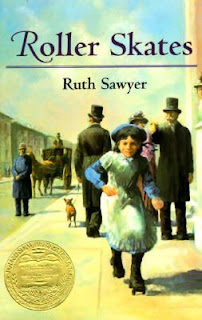
I’ve always aspired to be a Pollyanna, a happy-go-lucky ray of sunshine that finds the good in every person. However, my natural cynicism and mistrust of people in general makes it difficult to open myself up to this way of life. Enter my new favorite heroine, Lucinda, from Roller Skates by Ruth Sawyer, winner of 1937 Newbery Medal, who seamlessly rides the balance between congeniality and realism.
Lucinda skates all over New York City on her polished roller skates, finding new friends wherever she goes. Her natural warmth and interest in others makes her instant friends with Mr. Gilligan, the cab driver, Patrolman M’Gonegal, Tony from the fruit stand, Trinket, her four year old upstairs neighbor, and many others. She touches each person’s life in a profound way, either through her own direct interaction or the connections she makes between her friends. She saves Tony from bullies who attack his fruit stand by enlisting the help of Patrolman M’Gonegal’s friend, Patrolman Jerry Hanlon. She gives Trinket her first real Christmas – complete with a green tree, lavish presents, and good friends. She shares countless hours with her Uncle Earl, reading Shakespeare together, when his own stepdaughters (which he calls the “gazelles”) express no interest in anything besides propriety and sewing. Lucinda is not a docile puppet who can acquiesce to her Aunt Emily’s demands to sit still, control her temper, and imitate her own girls. In one instance, her aunt keeps calling her “homely as two toads” until “something goes off inside Lucinda like fireworks…and shouts, “Glory be to God, Aunt Emily, if you must say it keep it down to one toad! I’m sick to death of two!” (34). Lucinda has a great amount of energy and expels much of it on her excursions around the city. Unlike Aunt Emily who tries to put Lucinda in a box, the colorful family that she has created for herself allows her to be wholly herself, and sees the deep beauty that shines from within.
All families encounter loss and death, and Lucinda’s makeshift family is no different. In true Lucinda fashion, she consoles the survivors like an adult and tells them about the Eskimo idea of death, how the soul becomes a gull, and then has her Uncle Earl make the funeral arrangements for them. Experiencing a death for the first time gives Lucinda a peek into the adult world of grief but also shows her youth. While she is usually the one who takes care of everyone else, in this moment, she lets herself slip into her guardian’s room and be held as she falls asleep.
Lucinda is transformed by her year in New York and the reader with her. She teaches us that we have no idea how deeply we can effect other’s lives and how we are, in turn, changed. While Pollyanna might say that all people are good, Lucinda would say that all people are interesting. And that is a philosophy that can inspire me.

No comments:
Post a Comment
Note: Only a member of this blog may post a comment.